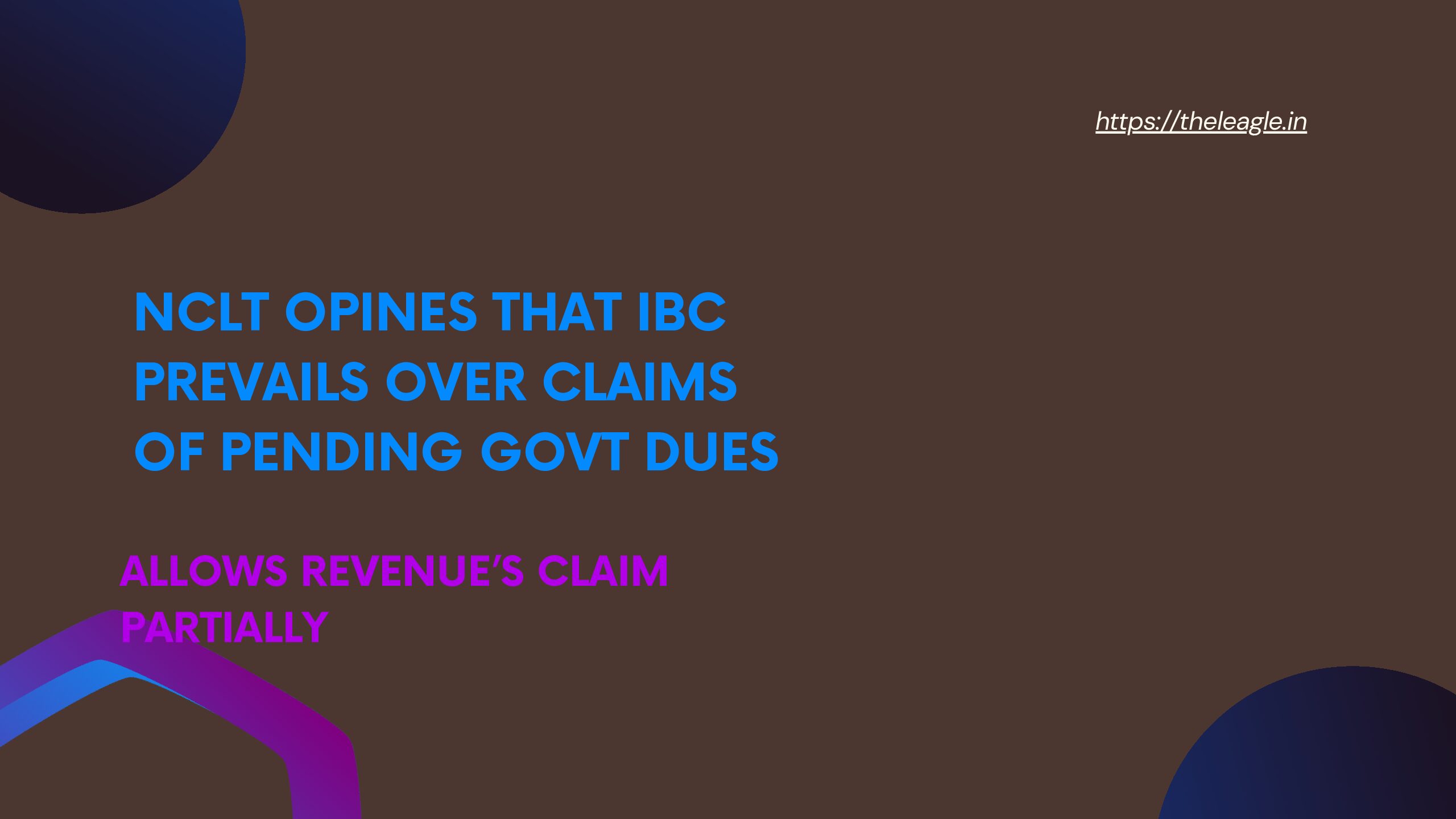In a recent order[1], NLCT Mumbai has ruled that the time bound process of Insolvency and Bankruptcy Code, 2016 (‘IBC’) will prevail over payment of belated Government dues, i.e., taxes. NCLT in the impugned case only reiterated an opinion expressed earlier, but the Revenue Department tends to need frequent reminders about certain elemental aspects of law.
Facts
In the impugned case, the Department of State (Tax) (‘Revenue Department’) filed an application under Section 60(5), IBC against the Resolution Professional of M/s Calchem Industries Pvt Ltd seeking directions that the Resolution Professional should deal with their claims and process them as per IBC. The Revenue Department had filed their claim with the Resolution Professional via letter/email on 08.10.2021 and the same was rejected by the latter on the ground that the Committee of Creditors had already approved the Resolution Plan on 13.10.2020.
The Revenue Department assailed the rejection of their application as illegal and relied on Regulation 14 of IBBI (Insolvency Resolution Process for Corporate Person) Regulations, 2016. As per Regulation 14 the Resolution Professional shall make best estimate of the amount of claim based on information available to him. The Revenue Department argued that since their claims are statutory dues, the Resolution Professional should have incorporated the same in his estimate. The Revenue Department cited certain precedents to support its claim and also argued, rather strangely, that the delay in their application was caused since they were following the due procedure of law. (para 14)
The Resolution Professional, on the other hand, largely defended its rejection of the Revenue Department’s application on the ground of delay. The Resolution Professional informed NCLT that the public announcement dated 1.10.2019 had clearly stated that the last date for filing of claims was 14.10.2019 while the Revenue Department filed its initial claim on 8.10.2021.
NCLT Decides
NCLT cited the RPS Infrastructure case[2] to reiterate that undecided claims cannot make the CRP process endless. And it concluded that:
Therefore, any interruption in the CIR process at this belated stage by allowing the application might open the floodgate for the similar claims, causing unnecessary delays in the CIRP process. (para 22)
NCLT, engaged with the various precedents cited by the Revenue Department in some detail and observed that one of the arguments made in previous cases was that since government dues would always be reflected in the books of account of the corporate debtor, the Resolution Professional should take them into account in its estimate. NCLT distinguished facts of the impugned case from the precedents and observed that out of the total amount claimed by the Revenue Department only some amount was reflected in the books of account on the date of initiation of CIRP. And that the assessment orders for other amounts were passed after initiation of CIRP. Thus, the latter could not have been reflected in the books of account of the corporate debtor at the time of initiation of CIRP.
NCLT emphasised on the objective of IBC which aimed for insolvency resolution of the corporate debtor in a time bound manner and that priority accorded to Government dues was different as compared to the Companies Act. In other words, government dues were not in top hierarchy under the waterfall mechanism of IBC. While the latter was not germane to the issue at hand, NCLT did well to remind the Revenue Department that is claims did not supersede ever other claim against the corporate debtor. NCLT, thus, disallowed the application of the Revenue Department except to the extent tax dues were reflected in the books of account of the corporate debtor on the date of preparation of the Memorandum of Information by the Resolution Professional. (para 27)
Conclusion
NCLT’s judgment in the impugned case, is another in a series of decisions where the Revenue Department has been informed that its dues are not sacrosanct and need to be secured only as per the timelines, processes and waterfall mechanism provided in the IBC. While in the impugned case, the Revenue Department secured a partial victory, and rightly so, it is another in a disconcerting trend where the Revenue Department tends to think, almost incorrigibly, that its tax dues should be paid irrespective of what the letter of law says.
[1] Department of State Tax v Resolution Professional of M/s. Calchem Industries (India Limited), IA/282/2022 & IA426/2022, available at https://nclt.gov.in/gen_pdf.php?filepath=/Efile_Document/ncltdoc/casedoc/2709138000222022/04/Order-Challenge/04_order-Challange_004_1696595733706984618651fff15f3463.pdf (Accessed on 13.10.2023).
[2] RPS Infrastructure Ltd v Mukul Kumar & Anr (2023) ibclaws.in 102 SC.
